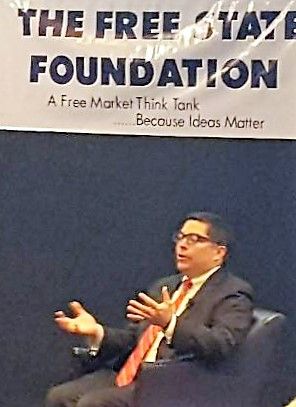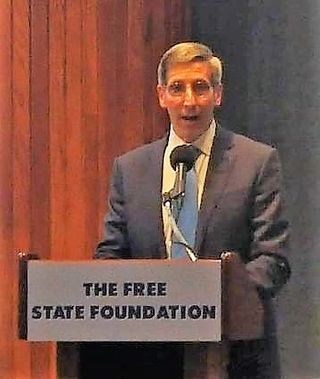Platforms, Privacy and 5G Integration Top Free State Foundation's Agenda
"All of our infrastructures are starting to look very similar," said NCTA executive VP James Assey during the first panel discussion of the Free State Foundation's 11th annual telecom policy forum in Washington (agenda) on Tuesday (March 26). His remark set the stage for much the day's perspective -- if not for total consensus -- throughout the day as industry and academic experts plus federal officials examined the need for new regulatory policies in an era of converging technologies, competing platform players and urgent privacy and security demands.
Assey also said that current conditions, including the emerging role of 5G wireless technology, augur the need to revise "Title VI" (rules in the 1984 Cable Communications Policy Act) that may no longer be valid.
"That type of hybrid architecture requires greater similarity" in policies, Assey said. "Any future approach to spectrum needs more coordination. Congress could speed that change."
Expanding his remarks to include the growing presence of platforms -- that is, non-telecom providers, such as Google and Apple -- Assey insisted that, "We're very confident in our path...and on keeping focused."
Fellow panelist Kathleen Ham, senior VP, government affairs at T-Mobile USA, endorsed Assey's view.
"We're at a crossroads," she said. "There's definitely a convergence going between cable and wireless," and in a predictable puff about the next generation wireless service, she added, "We don't know what 5G will bring, but it's going to be good." She acknowledged that new competitive policy-making should be part of the legislative agenda.
Further supporting the need to prepare for the shifting environment, Verizon senior VP Kathleen Grillo focused on her "concern" about state laws on platform accountability as well as rules on privacy and issues such as 5G tower siting that are "confusing for consumers." She stressed that such complications underscore the "value of a national framework."
An FSF panel of academic experts further set the stage for new policies, which also happened to be the subtitle for FSF's seminar: "Getting Law and Policy Right."
"The distinction between the web and the edge are becoming indistinct," said University of Pennsylvania Law Professor Christopher Yoo, noting that it is "harder to justify net neutrality," and proposing that a future evaluation will involve "device neutrality."
FCC's O'Rielly and FTC's Simons Weigh In
FCC commissioner Michael O'Rielly agreed that the policy "structure should be changed."

"How we define the marketplace is so important in the video space," he said, emphasizing that this is no longer "just about cable, broadcast or satellite.
"Many of the FAANGs are fighting for the same space," O'Rielly said, using the popular acronym for Facebook, Apple, Amazon, Netflix and Google. "The silos we've lived with for so long are no longer appropriate. We have to take that to the legislature. Title VI no longer makes any sense."
In an on-stage dialogue with former Congressman (and retired Verizon lobbyist) Tom Tauke, O'Rielly also said that he is not "squeamish" about pre-empting state or local regulations on issues such as wireless tower siting or other factors.
"Absolutely not," he said. "Wireless spectrum does not respect [local] boundaries. The internet is interstate in nature, and I'm willing to preempt" whatever is necessary.
Federal Trade Commission chairman Joseph Simons, in the concluding keynote of the FSF program, focused on paid prioritization and the FTC's newly launched data handling review of internet service providers, which was unveiled that day.

"Paid prioritization is a type of price discrimination, which is ubiquitous in the economy" and not illegal, Simons said. He cited loyalty cards, coupons, senior discounts and frequent shopper deals as comparable legal price preferences.
But he warned that the FTC "could take action against ISPs if they block applications without adequately disclosing those practices or mislead[ing] consumers about what applications they block or how."
"Our consumer protection authority could also apply to throttling," Simons added. "We would consider whether the alleged throttling had countervailing benefits, and whether there were reasonable steps consumers could have taken to avoid it."
Simons also joined the call to seek more direction from Congress on how to handle privacy and data security issues.
"I have urged Congress to enact legislation that would give the FTC three tools," he told the FSF audience, citing civil penalties for privacy and data security violations; targeted rulemaking authority involving technological developments; and jurisdiction over nonprofits and common carriers.
"The process of enacting federal privacy legislation will involve difficult policy tradeoffs that I believe are appropriately left to Congress," Simons said.
As for its latest enforcement of ISP privacy practices, he said the focus will be on how ISPs are collecting, using, combining and disclosing personal information about consumers that they collect via fixed and mobile internet, advertising platforms and analytical services.
Simon's remarks summarized an underlying theme of the FSF conference: the growing recognition that converging technologies and overlapping services require a new approach to regulatory policies.
Multichannel Newsletter
The smarter way to stay on top of the multichannel video marketplace. Sign up below.
Contributor Gary Arlen is known for his insights into the convergence of media, telecom, content and technology. Gary was founder/editor/publisher of Interactivity Report, TeleServices Report and other influential newsletters; he was the longtime “curmudgeon” columnist for Multichannel News as well as a regular contributor to AdMap, Washington Technology and Telecommunications Reports. He writes regularly about trends and media/marketing for the Consumer Technology Association's i3 magazine plus several blogs. Gary has taught media-focused courses on the adjunct faculties at George Mason University and American University and has guest-lectured at MIT, Harvard, UCLA, University of Southern California and Northwestern University and at countless media, marketing and technology industry events. As President of Arlen Communications LLC, he has provided analyses about the development of applications and services for entertainment, marketing and e-commerce.

